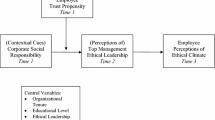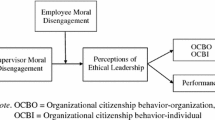Abstract
Drawing on theory and research on ethical leadership and ethical climate, we examine ethical climate as a mediator of the relationship between ethical leadership and employee misconduct. Using a sample of 1,525 employees and their supervisors in 300 units in different organizations, we find support for our hypothesized model. We discuss theoretical and practical implications of these findings.
Similar content being viewed by others
References
Anderson, J. and D. Gerbing: 1988, ‘Structural Equation Modeling in Practice: A Review and Recommended Two-Step Approach’, Psychological Bulletin 103, 411-423.
Arbuckle, J. L.: 1997, Amos Users’ Guide, (Small Waters Corporation, Chicago).
Bandura, A.: 1977, ‘Self-efficacy: Toward a Unifying Theory of Behavioral Change’, Psychological Review 84, 191-215.
Bandura, A.: 1986, Social Foundations of Thought & Action, (Prentice-Hall, Englewood Cliffs).
Bartels, L., E. Harrick, E. Marel and D. Strickland: 1998, ‘The Relationship between Ethical Climate and Ethical Problems within Human Resource Management’, Journal of Business Ethics 17, 799-804.
Blau, P.: 1964, Exchange and Power in Social Life (John Wiley, New York)
Bliese, P.: 1998, ‘Group Size, ICC Values, and Group-Level Correlations: A Simulation’, Organizational Research Methods 1, 355–373
Bliese, P.: 2000, ‘Within-Group Agreement, Non-Independence, and Reliability: Implications for Data Aggregation and Analysis’, in K. J. Klein and S. W. J. Kozlowski (eds.), Multilevel Theory, Research and Methods in Organizations, (Jossey-Bass, San Francisco), pp. 512-556.
Bliese, P., R. R. Halverson and C. A. Schriesheim: 2002, ‘Benchmarking Multilevel Methods in Leadership: The Articles, the Model, and the Data Set’, Leadership Quarterly 13, 3-15.
Bollen, K. A.: 1989, Structural Equations with Latent Variables, (Wiley, New York).
Brown, M. E. and L. K. Treviño: 2006, ‘Ethical Leadership: A Review and Future Directions’, The Leadership Quarterly 17, 595-616.
Brown, M. E., L. K. Treviño and D. A Harrison: 2005, ‘Ethical Leadership: A Social Learning Perspective for Construct Development and Testing’, Organizational Behavior and Human Decision Processes 97, 117-134.
Browne, M. W. and R. Cudeck: 1993, ‘Alternative Ways of Assessing Model Fit’, in K. A. Bollen and L. J. Scott (eds.), Testing Structural Equation Models (Sage, Newbury Park).
Campbell, J., M. Dunnette, E. Lawler and K. Weick: 1970, Managerial Behavior, Performance, and Effectiveness, (McGraw-Hill, New York).
Colquitt, J. A., R. A. Noe and C. L. Jackson: 2002, ‘Justice in Teams: Antecedents and Consequences of Procedural Justice Climate’, Personnel Psychology 55, 83-109.
Davis, A. and H. Rothstein: 2006, ‘The Effects of the Perceived Behavioral Integrity of Managers on Employee Attitudes: A Meta-Analysis’, Journal of Business Ethics 67, 407-419.
Dickson, M., M. W. Smith, M. C. Grojean and M. W. Ehrhart: 2001, ‘An Organizational Climate Regarding Ethics: The Outcome of Leader Values and the Practices that Reflect Them’, Leadership Quarterly 12, 197-214.
Engelbrecht, A. S., A. S. van Aswegan and C. C. Theron: 2005, ‘The Effect of Ethical Values on Transformational leadership and Ethical Climate in Organizations’, South African Journal of Business Management 36, 19-26.
Ethics Resource Center: 2007, ‘National Business Ethics Survey 2007: An Inside View of Private Sector Ethics (Author, Washington, DC).
George, J. M. and L. R. James: 1993, ‘Personality, Affect, and Behavior in Groups Revisited: Comment on Aggregation, Level of Analysis, and a Recent Application of Within and Between Analysis’, Journal of Applied Psychology 78, 798-804.
Grojean, M., C. Resick, M. Dickson and D. B. Smith: 2004, ‘Leaders, Values, and Organizational Climate: Examining Leadership Strategies for Establishing an Organizational Climate Regarding Ethics’, Journal of Business Ethics 55, 223-241.
Hofmann, D. A. and A. Stetzer: 1998, ‘The Role of Safety Climate and Communication in Accident Interpretation: Implications for Learning From Negative Events’, Academy of Management Journal 41, 644-658.
Hox, J.: 2002, Multilevel Analyses: Techniques and Applications, (Lawrence Erlbaum Associates, Mahwah, NJ).
James, L. R., S. A. Mulaik and J. M. Brett: 2006, ‘A Tale of Two Methods’, Organizational Research Methods 9, 233-244.
Jöreskog, K. G. and D. Sörbom: 2006, LISREL for Windows, (Scientific Software International, Inc., Lincolnwood, IL).
Kozlowski, S. W. and M. L. Doherty: 1989, ‘Integration of Climate and Leadership: Examination of a Neglected Issue’, Journal of Applied Psychology 74, 546-553.
Kuenzi, M. and M. Schminke: 2009: ‘Assembling Fragments into a Lens: A Review, Critique, and Proposed Research Agenda for the Organizational Climate Literature’, Journal of Management 35, 634-717.
Litwin, G. and R. Stringer: 1968, Motivation and Organizational Climate, (Harvard University, Oxford, England).
MacKinnon, D. P., C. M. Lockwood, J. M. Hoffman, S. G. West and V. Sheets: 2002. ‘A Comparison of Methods to Test Mediation and Other Intervening Variable Effects’, Psychological Methods 7, 83-104.
Martin, K. and J. Cullen: 2006, ‘Continuities and Extensions of Ethical Climate Theory: A Meta-Analytic Review’, Journal of Business Ethics 69, 175-194.
Mayer, D. M., M. Kuenzi and R. Greenbaum: 2010, ‘Laying an Ethical Foundation: Ethical Practices, Ethical Climate, and Unethical Behavior’, Paper Presented at the Annual Meeting of the Academy of Management, Montreal, Canada.
Mayer, D. M., M. Kuenzi and R. Greenbaum: 2009, ‘Making Ethical Climate a Mainstream Topic: A Review, Critique, and Prescription for the Empirical Research on Ethical Climate’, in D. De Cremer (ed.), Psychological Perspectives on Ethical Behavior and Decision Making (Information Age Publishing, Charlotte, NC), pp. 181-213.
Mayer, D. M, M. Kuenzi, R. Greenbaum, M. Bardes and R. Salvador: 2009, ‘How Low Does Ethical Leadership Flow? Test of a Trickle-Down Model’, Organizational Behavior and Human Decision Processes 108, 1-13.
Mayer, D. M., K. Aquino, R. L. Greenbaum and M. Kuenzi: in press, `Who Displays Ethical Leadership and Why Does It Matter: An Examination of Antecedents and Consequences of Ethical Leadership', Academy of Management Journal
Neubert, M. J., D. S. Carlson, K. M. Kacmar, J. A. Roberts and L. B. Chonko: 2009, ‘The Virtuous Influence of Ethical Leadership Behavior: Evidence from the Field’, Journal of Business Ethics 90, 157-170.
Peterson, D.: 2002,’The Relationship between Unethical Behavior and the Dimensions of the Ethical Climate Questionnaire’, Journal of Business Ethics 41, 313-326.
Piccolo, R. F., R. Greenbaum, D. N. den Hartog and R. Folger: 2010, ‘The Relationship between Ethical Leadership and Core Job Characteristics’, Journal of Organizational Behavior 31, 259-278.
Richardson, H. A. and R. J. Vandenberg: 2005, ‘Integrating Managerial Perceptions and Transformational Leadership into a Work-Unit Level Model of Employee Involvement’, Journal of Organizational Behavior 26, 561-589.
Robinson, S. L. and A. M. O’Leary-Kelly: 1998, ‘Monkey See, Monkey Do: The Influence of Work Groups on the Antisocial Behavior of Employees’, Academy of Management Journal 41, 658-672.
Salancik, G. R. and J. Pfeffer: 1978, ‘A Social Information Processing Approach to Job Attitudes and Task Design’, Administrative Science Quarterly 23, 224-253.
Schminke, M., M. Ambrose, M. and D. Neubaum: 2005, ‘The Effect of Leader Moral Development on Ethical Climate and Employee Attitudes’, Organizational Behavior and Human Decision Processes 97, 135-151.
Schneider, B.: 1983, ‘Interactional Psychology and Organizational Behavior’, in L. L. Cummings and B. M. Staw (eds.), Research in Organizational Behavior, vol. 5 (JAI Press, Greenwich, CT), pp. 1-31.
Schneider, B., S. White, S. and M. Paul: 1998, ‘Linking Service Climate and Customer Perceptions of Service Quality: Test of a Causal Model’, Journal of Applied Psychology 83, 150-163.
Schwepker, Jr., C., O. Ferrell and T. Ingram: 1997, ‘The Influence of Ethical Climate and Ethical Conflict on Role Stress in the Sales Force’, Journal of the Academy of Marketing Science 25, 99-108.
Simons, T., R. Friedman and L. A. Liu: 2007, ‘Racial Differences in Sensitivity to Behavioral Integrity: Attitudinal Consequences, In-Group Effects, and “Trickle Down” Among Black and Non-Black Employees’, Journal of Applied Psychology 92, 650-665.
Stringer, R.: 2002, Leadership and Organizational Climate, (Pearson Education, Inc, Upper Saddle River, NJ).
Tracey, J. B. and M. Tews: 2005, ‘Construct Validity of a General Training Climate Scale’, Organizational Research Methods 8, 353-374.
Vardi, Y.: 2001, ‘The Effects of Organizational and Ethical Climates on Misconduct at Work’, Journal of Business Ethics 29, 325-337.
Victor, B. and J. B. Cullen: 1988, ‘The Organizational Bases of Ethical Work Climates’, Administrative Science Quarterly 33, 101-125.
Walumbwa, F. O., B. J. Avolio, W. L. Gardner, T. S. Wernsing and S. J. Peterson: 2008, ‘Authentic Leadership: Development and Validation of a Theory-Based Measure’, Journal of Management 34, 89-126.
Walumbwa, F. O. and J. Schaubroeck: 2009, ‘Leader Personality and Employee Voice Behavior: Mediating Roles of Ethical Leadership and Work Group Psychological Safety’, Journal of Applied Psychology 94, 1275-1286.
Walumbwa, F. O., D. M. Mayer, P. Wang, H. Wang, K. Workman and A. L. Christensen: in press, ‘Linking Ethical Leadership to Employee Performance: The Roles of Leader-Member Exchange, Self-Efficacy, and Organizational Identification', Organizational Behavior and Human Decision Processes
Wimbush, J., J. Shepard, and S. Markham: 1997, ‘An Empirical Examination of the Relationship between Ethical Climate and Ethical Behavior from Multiple Levels of Analysis’, Journal of Business Ethics 16, 1705-1716.
Zohar, D. and G. Luria: 2005, ‘A Multilevel Model of Safety Climate: Cross Level Relationships between Organization and Group-Level Climates’, Journal of Applied Psychology 90, 616-628.
Author information
Authors and Affiliations
Corresponding author
Rights and permissions
About this article
Cite this article
Mayer, D.M., Kuenzi, M. & Greenbaum, R.L. Examining the Link Between Ethical Leadership and Employee Misconduct: The Mediating Role of Ethical Climate. J Bus Ethics 95 (Suppl 1), 7–16 (2010). https://doi.org/10.1007/s10551-011-0794-0
Published:
Issue Date:
DOI: https://doi.org/10.1007/s10551-011-0794-0




